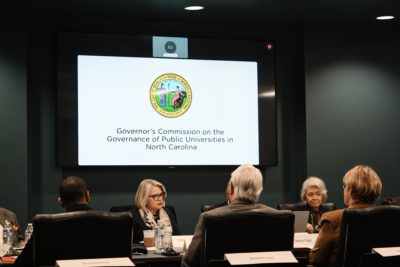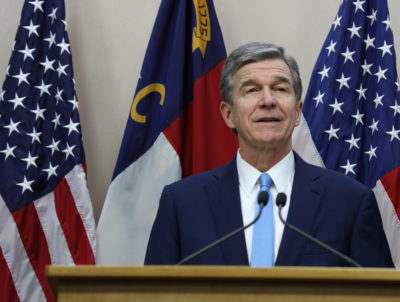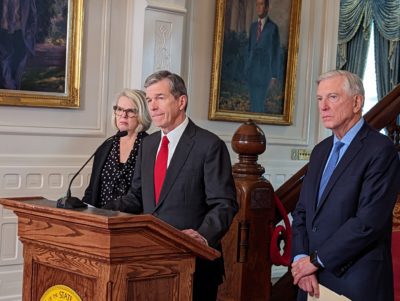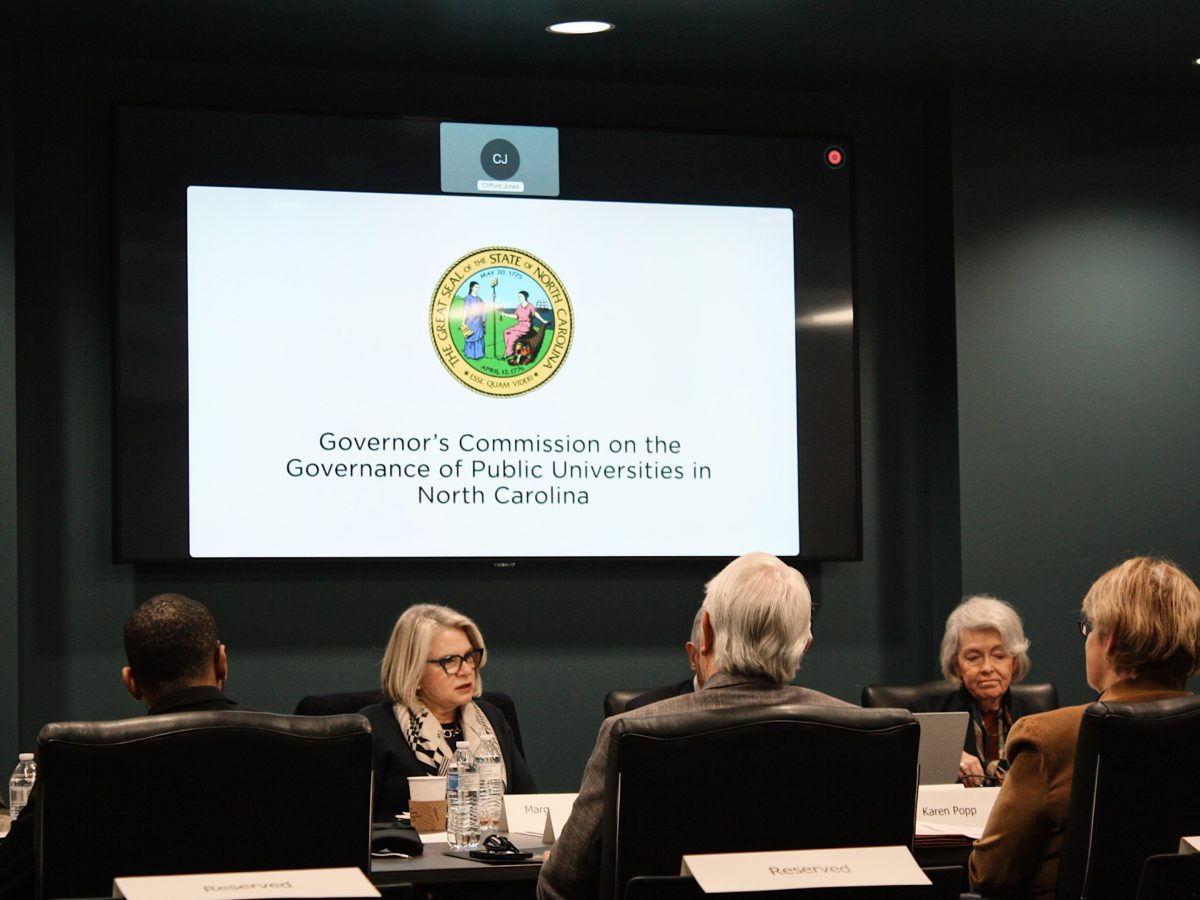

|
|
This story was updated Feb. 14 at 4:00 p.m. with information from Gov. Cooper’s Feb. 14 press release about the listening sessions.
Gov. Roy Cooper’s commission to study public university governance will host six public listening sessions across the state over the next three months, the commission announced at its second meeting on Tuesday, Feb. 7.
The public sessions, meant to gather stakeholder input on improving public university governance, will begin on Feb. 21 and run through mid-April. Commissioners will use input to develop recommendations on university governance reform, due in a report to the governor by July 1.
“The purpose of the Forums [is] to hear ideas and suggestions for improvement of our current governance structure,” says a draft public hearing letter. “The Forums are not an opportunity to air grievances or discuss past failures. Efforts to speak to such matters will be out of order.”
See the list below for a full schedule of the meetings, as listed in Gov. Cooper’s Feb. 14 press release. Some of the locations are different from the commission’s draft schedule on Feb. 7. A few commissioners will be present at each forum.
- Session 1: Tuesday Feb. 21 from 11 a.m. to 2 p.m. in Wilmington. Location: Live Oak Bank – Lucky Dog Auditorium, Building One.
- Session 2: Tuesday, Feb. 28 from 9 a.m. to noon in Asheville. Location: Asheville Chamber of Commerce.
- Session 3: Monday, March 13 from 9 a.m. to noon in Charlotte. Location: Charlotte Chamber of Commerce.
- Session 4: Monday, March 20 from 10 a.m. to 1 p.m. in Greenville. Location: Pitt Community College.
- Session 5: Tuesday, April 4 from 1 p.m. to 4 p.m in Greensboro. Location: Guilford Technical Community College.
- Session 6: Tuesday, April 11 from 9 a.m. to noon in Durham. Location: Durham Chamber or Durham Technical Community College.
The commission will send a letter detailing the event to district offices and various stakeholder groups at universities soon. Attendees who wish to speak should sign up to do so, commissioners said, by contacting Minda Watkins at minda.watkins@nc.gov at least two days prior to the session.
Not all individuals are guaranteed an opportunity to speak, the Feb. 14 release says, and priority will be given to those that sign up by the deadline. Each speaker will have two to three minutes.
Each session will start with an opening statement and include a virtual option and time for questions. Sessions will also be recorded.
“North Carolina’s public universities are the best in the country, but we know their leadership does not reflect the demographic and political diversity of our state,” Cooper said in his Feb. 14 release. “These Forums will provide a critical opportunity for the voices of the people to be heard about how we can improve higher education for generations to come.”
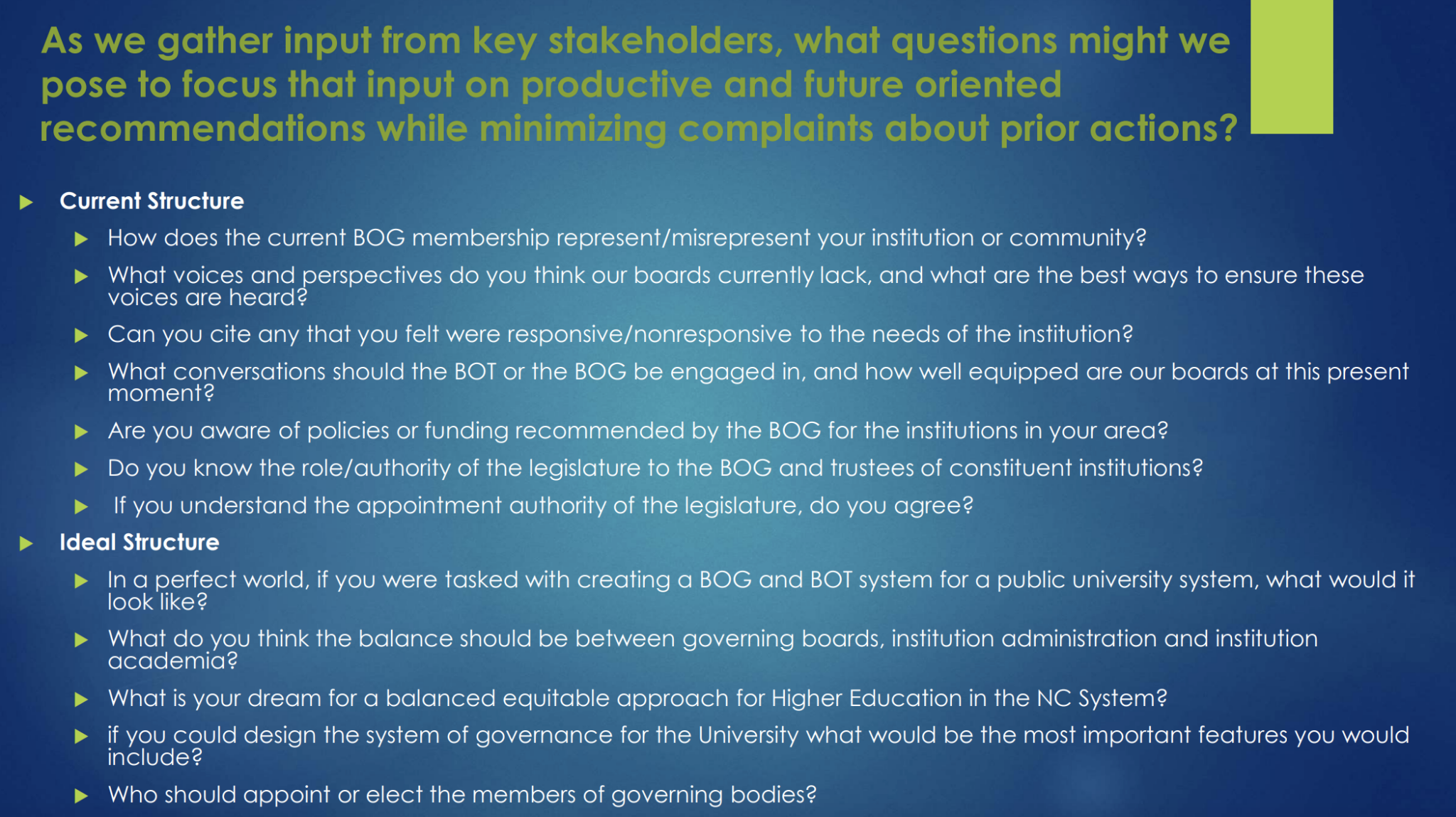

Next steps
On Tuesday, Feb. 7, commissioners discussed the role of governing boards along with the priorities of commissioners, based on questionnaire data. The commission also heard invited testimony from various UNC System stakeholders, along with additional data requested at the December meeting.
The commission will meet again in mid-April or early May following the public sessions and then again in June. Co-Chair Tom Ross previously said additional virtual meetings are possible.
Between now and the next meeting, Ross said he would work to narrow down the scope of the commission’s report with Co-Chair Margaret Spellings, who was not present on Tuesday. Any changes to the appointment process of university leaders would have to be approved by the legislature.
Diversity of boards
During a presentation on commissioners’ questionnaire responses, Ross said there was general agreement among them to explore ways to strengthen diversity of trustees and the Board of Governors. The strongest emphasis was on geographic diversity, he said. Other areas suggested included experience, gender, race/ethnicity, sector, and thought.
The demographics of UNC system trustees do not “perfectly mirror” the demographics of the state’s population or public university student enrollment, according to a report by Davidson College presented in December.
The majority of system trustees are male and white, the report found, with a plurality of Republicans. There is only one registered Democrat on the Board of Governors, and there are zero Hispanic or Asian members on the Board of Governors.
“You end up with better policies and insight when you have different voices,” Ross said in December. “It does not guarantee performance, but it does enhance the chances of good performance.”
On Tuesday, Davidson College presented additional data the commissioners requested in December. That data included institutional demographics related to political affiliation, comparisons of UNC system institution boards to other boards, and data on community college boards.
Here are a few highlights from the presentation:
- Based on N.C. voter registration, three UNC institutional boards are majority Republican, along with the Board of Governors. Two boards are majority Democrat – both are historically black colleges and universities.
- Only N.C. State University and University of North Carolina at Greensboro have an even number of Republicans and Democrats.
- The average board in the UNC System is 3:1 male. Only UNC Greensboro has more female board members than males.
- Excluding N.C. Agricultural & Technical State University, UNC board members are 3:1 white.
- At the N.C. State Board of Community Colleges, almost 70% of members are male and around 70% are white.
- Among community college boards of trustees, 62% are male and 80% are white. Out of 790 total institutional trustee members, only 8 are Asian and 11 Hispanic.
- The State Board of Community Colleges is evenly split between registered Republicans and Democrats.
Appointment processes
Commissioners suggested multiple approaches to strengthening diversity in the questionnaire, but two main strategies emerged: creating goals/requirements to appoint members based on various aspects of diversity and updating the nomination and vetting processes.
Multiple commissioners raised questions about the legality of requiring diversity in appointments.
The appointment process used to require at least minimal representation on the Board of Governors, four seats each, for women, racial minorities, and members of the minority political party. In 2001, the General Assembly appealed that language following a lawsuit. The amended statue reads:
“In electing members, the objective shall be to obtain the services of the citizens of the State who are qualified by training and experience to administer the affairs of The University of North Carolina. Members shall be selected based upon their ability to further the educational mission of The University through their knowledge and understanding of the educational needs and desires of all the State’s citizens, and their economic, geographic, political, racial, gender, and ethnic diversity.”
Among other information items, commissioners received recommendations from the N.C. Center for Public Policy Research’s 2006 report on strengthening UNC System governance, including how Board of Governors members should be selected.
Those recommendations include the governor making appointments of members (not just the General Assembly), assuring diverse representation, making the student member a voting member, and rejecting the “flagship status” of certain universities, among others.
You can view all of the recommendations – many of which the commissioners discussed – in this PDF version of the report on pages 294 to 324.
The commission also discussed possible disqualifications for board members, such as lobbying, along with qualifications to prioritize. The slide below outlines the main topics of that discussion.
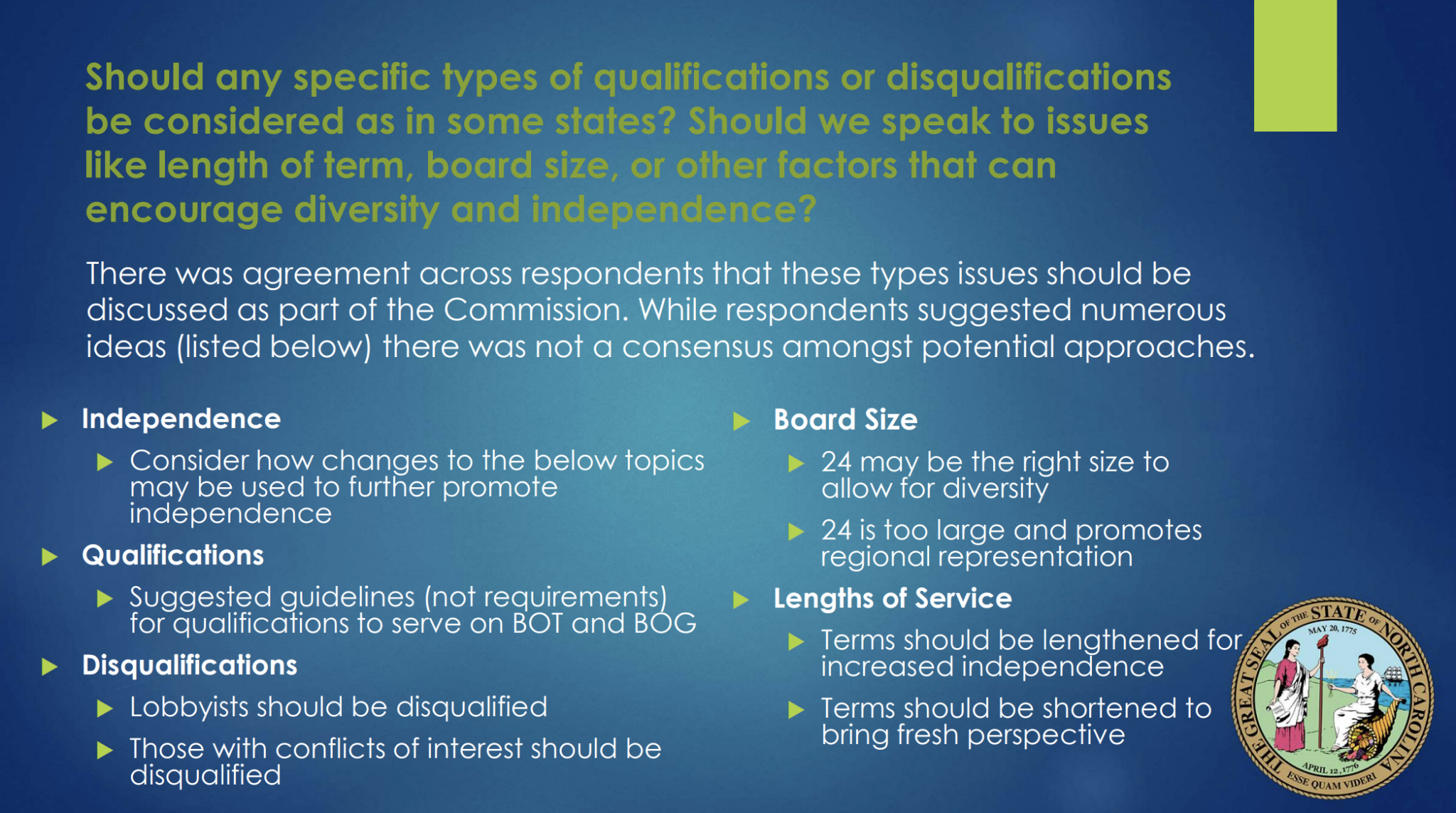

The commissioners also heard the following presentations:
- The Role of the Governing Board, by the Southern Association of Colleges and Schools Commission on Colleges
- Information from the Education Commission of the States, as requested by the commission, about various governance structures and appointing processes
Background on the commission
Gov. Cooper announced the commission on Nov. 1, citing signs of undue political influence and bureaucratic meddling among university governance in the state.
The 15-member commission, co-chaired by former UNC System leaders Tom Ross and Margaret Spellings, will study how the governance of N.C. public universities can be reformed. The commission, which met for the first time on Dec. 14, will specifically look at the appointment methods for the UNC Board of Governors and various boards of trustees around the state.
“North Carolina’s visionary leadership in higher education has distinguished our state and made a real difference in the lives of people,” Cooper said in December. “But we know there are signs of trouble that come when all of the appointed leaders are chosen by too few — signs of intolerance, bureaucratic meddling, undue influence, and singularity of political thought.”


This executive order deals with the state’s public university system, not the N.C. Community College System (NCCCS).
The UNC System is made up of 16 public universities that serve nearly 250,000 students each year. Members of the UNC System Board of Governors, which oversees the entire system, are appointed by the state legislature. The Board of Governors then controls appointments to the individual universities’ boards of trustees as well as chancellors and presidents.
At the announcement of the commission, Cooper said his goal is to prepare a proposal for consideration by the end of this year’s long session, which started last month.
“I think in April it’s likely we’re going to want to begin to pare down some thoughts and ideas as to what we might want to include in a report,” Ross said at the end of the February meeting. “All this has been very helpful – to hear information and hear people’s questions and get a sense of what people think are good ideas and might be worth considering. So we’ll see what we learn in the public hearings.”
You can read the executive order establishing the commission here. You can also find information about the commission and its upcoming meetings on the governor’s website.



